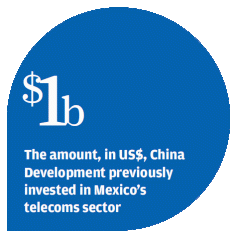
China offers to fund Mexico telecoms networks
Huawei expected to supply equipment under cheap loans to fund Mexico City's US$750m plan to extend phone links to rural areas
Chinese officials have offered the Mexican government funding for two telecommunications networks it is planning to build, sources said.
The networks, estimated by the Mexican government to cost about US$750 million, are meant to reach rural areas in the country where America Movil is often the sole phone provider.

China Development Bank, which awards competitive, low-interest loans as part of the central government's push to encourage Chinese companies to go abroad, was in discussions to provide the funding, the sources said.
One source said other state-owned Chinese banks could participate in the deal.
A deal would help China expand its influence in Latin America, where Huawei has been a supplier to companies such as America Movil and Telefonica. Mexico would get a boost in its plan to create more competition for America Movil, the country's dominant phone company.
While President Enrique Pena Nieto's administration has not disclosed talks with Chinese officials about the networks, it has embraced the idea of working with China.
"There's a huge potential to generate more investment, more jobs, if Mexico succeeds in attracting Chinese capital," Finance Minister Luis Videgaray said last month when asked about talks with China on telecommunications networks. "We see a positive trend and growing Chinese investment in Mexico."
Videgaray declined to talk about specific projects and would not confirm or deny talks with Chinese officials on telecommunications.
The Mexican government was also talking to groups from other countries and might choose not to work with the Chinese, one source said.
Installation of the planned networks, designed to service rural areas where it has been unprofitable to operate, will begin by the end of this year and the networks are expected to be fully operational by 2018.
The networks include a web of fibre-optic threads criss-crossing the country to haul data across long distances and wireless spectrum that would be sold on a wholesale basis to mobile-phone companies that need capacity.
"We're meeting operators, funding groups and consultants to determine what the best business model is for the wireless network as well as the backbone one," Deputy Communications Minister Jose Ignacio Peralta said last month. "Definitely, we think there must be an important private capital investment, from national or international groups."
China Development Bank has experience investing in the telecommunications sector in Mexico. In 2009, it lent America Movil US$1 billion to upgrade its mobile network. At the time, America Movil's chief financial officer, Carlos Garcia Moreno, said it received "very good financing". The credit line was used to refinance purchases of wireless-network equipment from Huawei.
NII Holdings also received a US$375 million credit line from the bank in 2011, expressly for the purchase of Huawei products.
The relationship between Chinese lenders and Huawei has put pressure on rivals, such as European firms Alcatel-Lucent, Ericsson and Nokia, which also compete for hardware business and have worked in tandem with their own nations' export banks.
Huawei, which did not win its first contract outside China until 1997, reported 239 billion yuan (HK$298 billion) in sales last year, an 8.6 per cent increase from 2012.
"Our customers choose to partner with us purely based on commercial reasons," Huawei spokesman Scott Sykes said, declining to comment on speculation about Huawei's plans in Mexico.
A Mexican deal with China could irk the United States. Huawei has been defending itself against US lawmakers' accusations that its equipment could be used for spying. SoftBank and Sprint told US lawmakers last year they would not integrate equipment from the Chinese company into Sprint's network.
"The Mexican government will have to say, here's the increase in risk, here's the savings - what's the trade-off?" said James Lewis, a senior fellow at the Centre for Strategic and International Studies in Washington.
Mexico estimates its new fibre-optic network will earn a return of about US$12 billion in five years, based on the positive economic growth in areas that broadband did not reach before.
The government's cost estimates of about US$15,000 per kilometre of fibre installed do not include the equipment needed to offer services to the final user, just the deployment of the network and the access infrastructure.
Large infrastructure projects would need outside help, said Alfredo del Mazo, the head of Mexican development bank Banobras.
"Collaboration with a country like China is of great importance to Mexico to be able to carry out large projects," del Mazo said.
